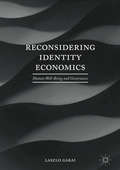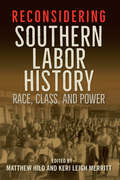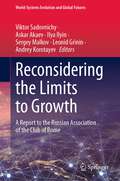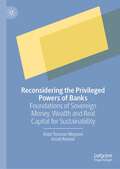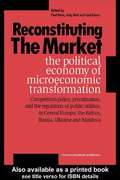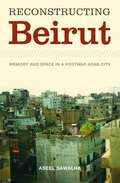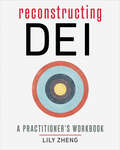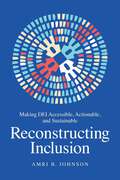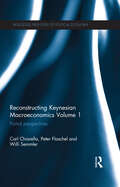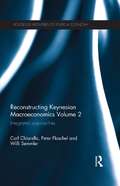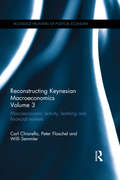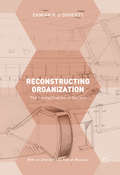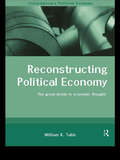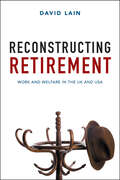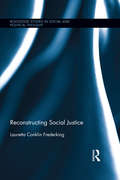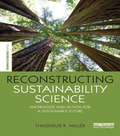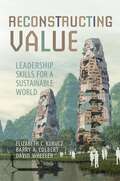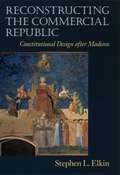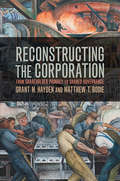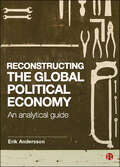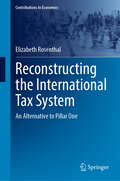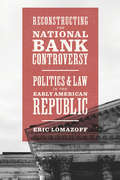- Table View
- List View
Reconsidering Identity Economics
by Laszlo GaraiThis book presents an unorthodox identity economics that approaches social identity through a non-classical psychology. Garai applies the modern physics concept of wave-particle duality to economic psychology, finding a corresponding duality in object-oriented activity and historically generated social identity. These two factors interconnect to create a double-storied structure of social identity and its behavioral manifestations. The book then presents a calculation device for mediating between behavioral and identity economics. Garai then applies all these factors to two socioeconomic systems developed during the second modernization: Bolshevik-type "socialism" and post-Bolshevik "capitalism. " In this context, he examines the Eastern Bloc nomenklatura as a duality of bureaucratic and patron-client organization ("state and party") and the establishment of both today's material capitalism and its other half: human capital economics.
Reconsidering Southern Labor History: Race, Class, and Power
by Matthew Hild and Keri Leigh MerrittUnited Association for Labor Education Best Book Award The American Dream of reaching success through sheer sweat and determination rings false for countless members of the working classes. This volume shows that many of the difficulties facing workers today have deep roots in the history of the exploitation of labor in the South. Contributors make the case that the problems that have long beset southern labor, including the legacy of slavery, low wages, lack of collective bargaining rights, and repression of organized unions, have become the problems of workers across the country. Spanning nearly all of U.S. history, the essays in this collection range from West Virginia to Florida to Texas. They examine vagrancy laws in the early republic, inmate labor at state penitentiaries, mine workers and union membership, and strikes and the often-violent strikebreaking that followed. They also look at pesticide exposure among farmworkers, labor activism during the civil rights movement, and foreign-owned auto factories in the rural South. They distinguish between different struggles experienced by women and men, as well as by African American, Latino, and white workers. The broad chronological sweep and comprehensive nature of Reconsidering Southern Labor History set this volume apart from any other collection on the topic in the past forty years. Presenting the latest trends in the study of the working-class South by a new generation of scholars, this volume is a surprising revelation of the historical forces behind the labor inequalities inherent today. Contributors: David M. Anderson | Deborah Beckel | Thomas Brown | Dana M. Caldemeyer | Adam Carson | Theresa Case | Erin L. Conlin | Brett J. Derbes | Maria Angela Diaz | Alan Draper | Matthew Hild | Joseph E. Hower | T.R.C. Hutton | Stuart MacKay | Andrew C. McKevitt | Keri Leigh Merritt | Bethany Moreton | Kristin O’Brassill-Kulfan | Michael Sistrom | Joseph M. Thompson | Linda Tvrdy
Reconsidering Value and Labour in the Digital Age (Dynamics Of Virtual Work)
by Christian Fuchs Eran FisherThis volume explores current interventions into the digital labour theory of value, proposing theoretical and empirical work that contributes to our understanding of Marx's labour theory of value, proposes how labour and value are transformed under conditions of virtuality, and employ the theory in order to shed light on specific practices.
Reconsidering the Limits to Growth: A Report to the Russian Association of the Club of Rome (World-Systems Evolution and Global Futures)
by Leonid Grinin Andrey Korotayev Ilya Ilyin Askar Akaev Viktor Sadovnichy Sergey MalkovEchoing the famous "The Limits to Growth" report from 1972, this edited volume analyses the changes that the World System has undergone to the present, on the fiftieth anniversary of the original report. During the past fifty years, both the concept and understanding of these limits have significantly changed. This book highlights that the evolution of the World System has approached a new critical milestone, moving into a fundamentally new phase of historical development, when the old economic and social technologies no longer work as efficiently as before or even begin to function counterproductively, which leads the World System into a systemic crisis. The book discusses the transition of human society to a new phase state, the shape of which has not yet been determined. New approaches are needed for both, for the analysis of the global situation, and for forecasts. The book is based on an integrated approach including the world-systems, historical and evolutionary perspectives, as well as a systematic view of society, in which changes in one subsystem cause transformations in others. Through mathematical modeling, it defines the main vectors of transformations of the World System; makes a detailed forecast of the development of all the main subsystems of the society and the World System, while presenting horizons of changes from short-term to ultra-long-term; and presents different development scenarios as well as recommendations on how to achieve a transition to the most favorable scenario. The book will appeal to members and followers of the Club of Rome, policy-makers, as well as to scholars from various disciplines interested in a better understanding of the World System evolution, global futures, development studies, climate change, and future societies.
Reconsidering the Privileged Powers of Banks: Foundations of Sovereign Money, Wealth and Real Capital for Sustainability
by Kozo Torasan Mayumi Ansel RennerThis book explores the privileged powers commercial banks hold, namely, their ability to create money out of nothing and then have that money grow in tune with a positive interest rate. Said powers defy, in an unnatural sense, the first and second laws of thermodynamics. The necessity of understanding the dual natures of money, wealth, and real capital, or, put differently, the reality that these three entities are simultaneously individual affluence and collective biophysical debt, is emphasized. The book culminates by proposing completely new foundations of money, wealth, and real capital for any society on a pathway of responsible development.
Reconstituting the Market: The Political Economy Of Microeconomic Transformation
by Judy Batt Paul HareReconstituting the Market details many transition economies - some already well known, others enjoying very little attention from researchers - and a range of important issues to do with state building and its links with microeconomic transformation. The book was based on the authors' view that transition in the new states would be fundamentally more difficult than in more established states - a view which turned out to be incorrect, since in all the transition countries the former communist state had to be largely rebuilt as part of the complex process of constructing a market economy. Aspects of this process, focusing on competition policy, privatization, and the regulation of public utilities, are examined in respect to Central Europe, the Baltics, Russia, Ukraine and Moldova. The result is essential reading for anyone seeking an up-to-date account of key transition issues, covering both familiar and unfamiliar countries.
Reconstructing AFGHANISTAN
by Adam Bennett Louis Dicks-Mireaux Ron Van Rooden Bruno De Schaetzen Felix Fischer Thierry KalfonFollowing the United States led military intervention in Afghanistan in 2001, the Taliban regime collapsed and a new interim government was established, with a new constitution signed and elections subsequently held in 2004. This publication examines the progress made to rebuild Afghanistan's economy and key institutions in the post-conflict environment, as well as discussing the challenges that remain. Chapters consider a range of issues including: a review of the political landscape, aid assistance programmes and the role of the IMF; recent macroeconomic developments, including policies to tackle poppy cultivation and opium production; the fiscal framework and the budget, including the National Program for Reconstruction; structural reforms, including reforming revenue policy and administration, and revitalising the civil service; monetary and exchange rate policy, including the choice of exchange rate regime; and financial sector developments, including legal aspects, the position of the central bank Da Afghanistan Bank, commercial banking, and the informal hawala system.
Reconstructing Beirut
by Aseel SawalhaOnce the cosmopolitan center of the Middle East, Beirut was devastated by the civil war that ran from 1975 to 1991, which dislocated many residents, disrupted normal municipal functions, and destroyed the vibrant downtown district. The aftermath of the war was an unstable situation Sawalha considers "a postwar state of emergency," even as the state strove to restore normalcy. This ethnography centers on various groups' responses to Beirut's large, privatized urban-renewal project that unfolded during this turbulent moment. At the core of the study is the theme of remembering space. The official process of rebuilding the city as a node in the global economy collided with local day-to-day concerns, and all arguments invariably inspired narratives of what happened before and during the war. Sawalha explains how Beirutis invoked their past experiences of specific sites to vie for the power to shape those sites in the future. Rather than focus on a single site, the ethnography crosses multiple urban sites and social groups, to survey varied groups with interests in particular spaces. The book contextualizes these spatial conflicts within the discourses of the city's historical accounts and the much-debated concept of heritage, voiced in academic writing, politics, and journalism. In the afterword, Sawalha links these conflicts to the social and political crises of early twenty-first-century Beirut.
Reconstructing DEI: A Practitioner's Workbook
by Lily ZhengAuthor of the bestselling DEI Deconstructed returns with a companion workbook filled with practical and actionable techniques for changemakers at all stages of their DEI journey.The next step in your DEI journey starts here. Building on the knowledge base of DEI Deconstructed, Lily Zheng offers a workbook with 40 original exercises, worksheets, and other tools to help guide you and your organization toward more substantive and lasting DEI outcomes. Whether you're a new or veteran DEI practitioner looking to improve your practice, a leader looking to grow your leadership skills, or an advocate looking to play more powerful roles in movements, this book will give you the practical tools to do just that. From self-work to organizational change, this workbook will upskill you with the core competencies required for impactful DEI work, such as diagnosing inequity, working with constituents, building movements, creating psychological safety, stewarding inclusive cultures, resolving conflict and harm, and achieving systems change. Most importantly, it will give you valuable experience putting these skills into action. Each activity can stand on its own and is designed to stimulate valuable reflection and practice. Included are recommendations for targeted exercise roadmaps to supplement your learning journey. Taken all together, these exercises are a complete masterclass in any practitioner's DEI education.
Reconstructing Inclusion: Making DEI Accessible, Actionable, and Sustainable
by Amri B. JohnsonOrganizational appetites for diversity, equity, and inclusion (DE&I) have never been more acute. But how can these new efforts, which often call on old strategies, now result in better outcomes? This book deconstructs and rebuilds the fundamental concepts of inclusion to reclaim their transformative potential for DE&I practitioners and the organizations they work with. Organizations of all types are making unprecedented investments in unconscious bias training, diversity recruitment, and anti-racism education. Words like belonging and equity are on the list of aspirational outcomes for these efforts, but the pathways to those goals are unclear because their implementation has been reactionary, supplemental, and in too many instances cosmetic rather than systemic. In Reconstructing Inclusion, Amri Johnson, CEO of Inclusion Wins, explores why that reactionary stance persists and provides a framework for designing a systematic approach that empowers all stakeholders in these efforts—everyone—to thrive. In deconstructing and rebuilding inclusion&’s most fundamental concepts, Johnson illustrates an &“Inclusion System&” that outlines the conditions critical to inclusion becoming normative—accessible, actionable, sustainable, and positively contributing to the organizational mission. Reconstructing Inclusion offers a guide to better understanding the historical context of inclusion, a rethinking of the efforts organizations are undertaking now, and an actionable, robust approach to carrying this work into the future.
Reconstructing Iraq's Budgetary Institutions
by James D. SavageThe invasion of Iraq led to a costly nine-year state-building and reconstruction effort. Reconstructing Iraq's budgetary institutions proved to be a vital element of the state-building project, as allocating Iraq's growing oil revenues to pay salaries and pensions, build infrastructure, and provide essential public services played a key role in the Coalition's counterinsurgency strategy. Consistent with the literature on state building, failed states, peacekeeping, and foreign assistance, this book argues that budgeting is a core state activity necessary for the operation of a functional government. Employing a historical institutionalist approach, this book first explores the Ottoman, British, and Ba'athist origins of Iraq's budgetary institutions. The book next examines American pre-war planning, the Coalition Provisional Authority's rule making and budgeting following the invasion of Iraq in 2003, and the mixed success of the Coalition's capacity-building programs initiated throughout the occupation. The budgetary process introduced by the Coalition offered a source of institutional stability in the midst of insurgency, sectarian division, economic uncertainty, and occupation. This book sheds light on the problem of outsiders building states, contributes to a more comprehensive evaluation of the Coalition in Iraq, addresses the question of why Iraqis took ownership of some Coalition-generated institutions, and helps explain the nature of institutional change.
Reconstructing Keynesian Macroeconomics Volume 1: Partial Perspectives
by Peter Flaschel Carl Chiarella Willi SemmlerThis book represents the first of three volumes offering a complete reinterpretation and restructuring of Keynesian macroeconomics and a detailed investigation of the disequilibrium adjustment processes characterizing the financial, the goods and the labour markets and their interaction. It questions in a radical way the evolution of Keynesian macroeconomics after World War II and focuses on the limitations of the traditional Keynesian approach until it fell apart in the early 1970s, as well as the inadequacy of the new consensus in macroeconomics that emerged from the Monetarist critique of Keynesianism. Professors Chiarella, Flaschel and Semmler investigate basic methodological issues, the pitfalls of the Rational Expectations School, important feedback channels in the tradition of Tobin’s work, and theories of the wage-price spiral and the evidences for them. The book uses primarily partial approaches, the integration of which will be the subject of subsequent volumes. With its focus on Keynesian propagation mechanisms, the research in this book provides a unique alternative to the black-box shock-absorber approaches that dominate modern macroeconomics. Reconstructing Keynesian Macroeconomics should be of interest to students and researchers who want to look at alternatives to the mainstream macrodynamics that emerged from the Monetarist critique of Keynesianism.
Reconstructing Keynesian Macroeconomics Volume 2: Integrated Approaches (Routledge Frontiers of Political Economy)
by Peter Flaschel Carl Chiarella Willi SemmlerThis book represents the second of three volumes offering a complete reinterpretation and restructuring of Keynesian macroeconomics and a detailed investigation of the disequilibrium adjustment processes characterizing the financial, the goods and the labour markets and their interaction. In this second volume the authors present a detailed analysis and comparison of two competing types of approaches to Keynesian macroeconomics, one that integrates goods, labour and financial markets, and another from the perspective of a conventional type of LM-analysis or interest-rate policy of the central bank. The authors employ rigorous dynamic macro-models of a descriptive and applicable nature, which will be of interest to all macroeconomists who use formal model-building in their investigations. The research in this book with its focus on Keynesian propagation mechanisms provides a unique alternative to the black-box shock-absorber approaches that dominate modern macroeconomics. The main conclusion of the work is that policy makers need to reconsider Keynesian ideas, but in the modern form in which they are expressed in this volume. Reconstructing Keynesian Macroeconomics will be of interest to students and researchers who want to look at alternatives to the mainstream macrodynamics that emerged from the Monetarist critique of Keynesianism. This book will also engage central bankers and macroeconomic policy makers.
Reconstructing Keynesian Macroeconomics Volume 3: Macroeconomic Activity, Banking and Financial Markets (Routledge Frontiers of Political Economy)
by Peter Flaschel Carl Chiarella Willi SemmlerThis book represents the third of three volumes offering a complete reinterpretation and restructuring of Keynesian macroeconomics and a detailed investigation of the disequilibrium adjustment processes characterizing the financial, the goods and the labour markets and their interaction. This book offers a full treatment of the interlinkages between the real and the financial markets, including an analysis of banking, credit, and endogenous money and asset markets. It remains critical of quite frequently used conventional macro models that have dropped the tradition of studying the macroeconomic feedback channels, well-known in the history of macroeconomics. Those feedback mechanisms are known to have the potential for instabilities with respect to real markets, price dynamics and financial markets. In this volume a particular emphasis is given to the financial-real interaction. The research in this book with its focus on Keynesian propagation mechanisms provides a unique alternative to the black-box shock-absorber approaches that dominate modern macroeconomics. The main conclusion of the work is that policy makers need to reconsider Keynesian ideas, but in the modern form in which they are expressed in this volume. Reconstructing Keynesian Macroeconomics will be of interest to students and researchers who want to look at alternatives to the mainstream macrodynamics that emerged from the Monetarist critique of Keynesianism. This book will also engage central bankers and macroeconomic policy makers.
Reconstructing Organization: The Loungification of Society
by Damian P. O’dohertyThis unique book breaks original ground in management and organization studies by drawing on over 2½ years of ethnographic study in a major UK international airport group. Much has been written about the ‘McDonaldisation’ or ‘Disneyization’ of society, but few have been attentive to what the author terms ‘Loungification of society’. A minor mode of organization, but one whose effects are likely to become ever more profound, this study shows how management and organization is itself being reconstructed and reshaped by way of loungification. Drawing on critical management studies, actor-network theory, and debates in contemporary anthropology around the so-called ontological turn, Reconstructing Organization enacts a veritable experiment in business and management studies. Who are these coming loungers? What do they want? Can we manage them? Or will they soon capture us with their talking chairs and ‘crinicultural’ politics?
Reconstructing Political Economy: The Great Divide in Economic Thought (Routledge Studies in Contemporary Political Economy)
by William K. TabbThis volume offers an original perspective on the questions the great economists have asked and looks at their significance for todays world. Written in a provocative and accessible style, it examines how the diverse traditions of political economy have conceptualised economic issues, events and theory. Going beyond the orthodoxies of mainstream economics it shows the relevance of political economy to the debates on the economic meaning of our times. Reconstructing Political Economy is a timely and thought-provoking contribution to a political economy for our time. In this light it offers fresh insights into such issues as modern theories of growth, the historic relations between state and market and the significance of globalisation for modern societies.
Reconstructing Retirement: Work and Welfare in the UK and USA
by David Dr LainRetirement is being ‘reconstructed’, with the UK following the US path of abolishing mandatory retirement and increasing state pension ages. This timely book assesses prospects for work and retirement at age 65-plus in the UK and US. Part 1 explores the shifting ‘policy logics’ in both countries that increase both the need and opportunities to work past age 65. Part 2 presents an original comparative statistical analysis on the wide range of factors influencing employment at this age. Part 3 proposes a series of policies across the life-course that would promote security and autonomy for older people. Pathways to employment after 65 are complex and pressures to work at this age are likely to result in very unequal outcomes. This book is essential reading for researchers, students and practitioners interested in the late careers and the future of retirement.
Reconstructing Social Justice: Reconstructing Social Justice (Routledge Studies in Social and Political Thought)
by Lauretta Conklin FrederkingThe rhetoric of social justice is commonplace but increasingly it means little more than a tag line or a punctuation point. Reconstructing Social Justice presents a new framework for social justice that will change the way people think about social justice and change the way people implement social justice. This book carves out an intellectual and practical space for social justice that is distinct from political, legal, and economic spheres. While emphasizing a distinct domain for social justice, the author then makes sense of its healing role in terms of the polity, economy, technology, and religion. Drawing from a rich supply of classroom experiences, her research on mosque controversies after September 11, 2001, and then the global examples of truth and reconciliation commissions, Frederking invites the reader to think about the relevance of social justice from the micro to the macro level. Rather than a set of policy outcomes or ideological positions, social justice is a process of social accountability that demands honest and transparent engagement. While disagreement is likely and controversy inevitable, this social justice process reaffirms our connectedness and moves us forward as a collective.
Reconstructing Sustainability Science: Knowledge and action for a sustainable future (The Earthscan Science in Society Series)
by Thaddeus R. MillerThe growing urgency, complexity and "wickedness" of sustainability problems—from climate change and biodiversity loss to ecosystem degradation and persistent poverty and inequality—present fundamental challenges to scientific knowledge production and its use. While there is little doubt that science has a crucial role to play in our ability to pursue sustainability goals, critical questions remain as to how to most effectively organize research and connect it to actions that advance social and natural wellbeing. Drawing on interviews with leading sustainability scientists, this book examines how researchers in the emerging, interdisciplinary field of sustainability science are attempting to define sustainability, establish research agendas, and link the knowledge they produce to societal action. Pairing these insights with case studies of innovative sustainability research centres, the book reformulates the sustainability science research agenda and its relationship to decision-making and social action. It repositions the field as a "science of design" that aims to enrich public reasoning and deliberation while also working to generate social and technological innovations for a more sustainable future. This timely book gives students, researchers and practitioners a valuable and unique analysis of the emergence of sustainability science, and both the opportunities and barriers faced by scientific efforts to contribute to social action.
Reconstructing Value
by David Wheeler Barry Colbert Elizabeth KuruczReconstructing Value prepares contemporary business leaders for the increasingly important task of developing a sustainability vision and translating it across levels in an organization. The book is based on insights gained over the past decade from research involving hundreds of practitioners, front line managers to senior executives, who have been working to integrate sustainability within their organizations. It illustrates how building capacity for managing the complex issues of sustainability requires key process skills that leaders need to develop.This book equips readers to respond to the risks and opportunities presented by global sustainability issues and reinvent new ways of doing business that will enhance organizational effectiveness while also building a more sustainable world. Each chapter includes process questions to guide reflective practice and to build the requisite leadership capabilities for turning a sustainability vision into a value-added organizational strategy. Reconstructing Value helps readers to build integrative thinking skills - such as how to engage critical, complexity, strategic and design thinking capabilities to enable organizational change - that can assist them with becoming successful sustainability champions within their organizations.
Reconstructing the Commercial Republic: Constitutional Design after Madison (Chicago Lectures In Mathematics Ser.)
by Stephen L. ElkinJames Madison is the thinker most responsible for laying the groundwork of the American commercial republic. But he did not anticipate that the propertied class on which he relied would become extraordinarily politically powerful at the same time as its interests narrowed. This and other flaws, argues Stephen L. Elkin, have undermined the delicately balanced system he constructed. In Reconstructing the Commercial Republic, Elkin critiques the Madisonian system, revealing which of its aspects have withstood the test of time and which have not. The deficiencies Elkin points out provide the starting point for his own constitutional theory of the republic—a theory that, unlike Madison’s, lays out a substantive conception of the public interest that emphasizes the power of institutions to shape our political, economic, and civic lives. Elkin argues that his theory should guide us toward building a commercial republic that is rooted in a politics of the public interest and the self-interest of the middle class. He then recommends specific reforms to create this kind of republic, asserting that Americans today can still have the lives a commercial republic is intended to promote: lives with real opportunities for economic prosperity, republican political self-government, and individual liberty.
Reconstructing the Corporation: From Shareholder Primacy to Shared Governance
by Grant M. Hayden Matthew T. BodieModern corporations contribute to a wide range of contemporary problems, including income inequality, global warming, and the influence of money in politics. Their relentless pursuit of profits, though, is the natural outcome of the doctrine of shareholder primacy. As the consensus around this doctrine crumbles, it has become increasingly clear that the prerogatives of corporate governance have been improperly limited to shareholders. It is time to examine shareholder primacy and its attendant governance features anew, and reorient the literature around the basic purpose of corporations. This book critically examines the current state of corporate governance law and provides decisive rebuttals to longstanding arguments for the exclusive shareholder franchise. Reconstructing the Corporation presents a new model of corporate governance - one that builds on the theory of the firm as well as a novel theory of democratic participation - to support the extension of the corporate franchise to employees.
Reconstructing the Global Political Economy: An Analytical Guide
by Erik AnderssonIn an era of post-globalisation, the global political economy needs restructuring. This future-orientated textbook examines the challenges facing the world economy as a result of climate change, social and economic inequality and provides future-oriented solutions. Andersson clearly presents and explains key concepts from Global Political Economy (GPE) to show how these can be used to design and analyse potential reconstructions of the global political economy, offering the analytical tools and inroads to this reconstruction. With a comprehensive exploration of the different ideological pathways that change might take, through intersecting dimensions of gender, race and class, the author expertly guides the reader through thematic chapters such as: • The political economy of everyday life • Regulation of global trade • Post-development • Global value chain production • Financial markets This textbook will help students and non-specialist readers to see that global economic change is possible and show how core concepts from GPE can enable clear thinking about a global future that is environmentally, socially and economically sustainable.
Reconstructing the International Tax System: An Alternative to Pillar One (Contributions to Economics)
by Elizabeth RosenthalSource-based taxation and the arm’s length standard have been foundational elements of the international tax system for many decades. With the advent of the highly digitalized platform firm, the OECD and many other stakeholders assert that these principles have been rendered obsolete. In their stead, these stakeholders have proposed an alternative hybrid international tax system. Under this proposed hybrid system, the long-standing profit allocation rules would be applied in the first instance to determine the preliminary attribution of in-scope multinational firms’ taxable income to individual taxing jurisdictions. These results would then be subject to a secondary reallocation designed to ensure that a portion of such firms’ taxable income is attributed to, and taxable by, jurisdictions in which consumers and users reside (“market jurisdictions”). This secondary allocation – the core of the OECD’s Pillar One and an essential element of its two-pronged “Pillar One-Pillar Two Solution” – explicitly deviates from both the arm’s length standard and the principle of source-based taxation. For many reasons, examined in this book, the OECD’s Pillar One would not provide for the effective taxation of highly digitalized platform firms, and, by extension, it would not stabilize the international tax system. The author argues that source-based taxation and the arm’s length standard are entirely compatible with the attribution of a portion of highly digitalized platform firms’ taxable income to market jurisdictions. However, new transfer pricing methodologies and a revised definition of ‘control’ for transfer pricing purposes are required to achieve this result. Combining important findings and insights from academic research in a variety of fields with the author’s extensive practical experience in both public and private spheres, this book is appropriate for academics as well as private sector advisors in the fields of transfer pricing and international tax, chief financial officers of multinational corporations and tax policy analysts.
Reconstructing the National Bank Controversy: Politics and Law in the Early American Republic
by Eric LomazoffThe Bank of the United States sparked several rounds of intense debate over the meaning of the Constitution’s Necessary and Proper Clause, which authorizes the federal government to make laws that are “necessary” for exercising its other powers. Our standard account of the national bank controversy, however, is incomplete. The controversy was much more dynamic than a two-sided debate over a single constitutional provision and was shaped as much by politics as by law. With Reconstructing the National Bank Controversy, Eric Lomazoff offers a far more robust account of the constitutional politics of national banking between 1791 and 1832. During that time, three forces—changes within the Bank itself, growing tension over federal power within the Republican coalition, and the endurance of monetary turmoil beyond the War of 1812 —drove the development of our first major debate over the scope of federal power at least as much as the formal dimensions of the Constitution or the absence of a shared legal definition for the word “necessary.” These three forces—sometimes alone, sometimes in combination—repeatedly reshaped the terms on which the Bank’s constitutionality was contested. Lomazoff documents how these three dimensions of the polity changed over time and traces the manner in which they periodically led federal officials to adjust their claims about the Bank’s constitutionality. This includes the emergence of the Coinage Clause—which gives Congress power to “coin money, regulate the value thereof”—as a novel justification for the institution. He concludes the book by explaining why a more robust account of the national bank controversy can help us understand the constitutional basis for modern American monetary politics.
